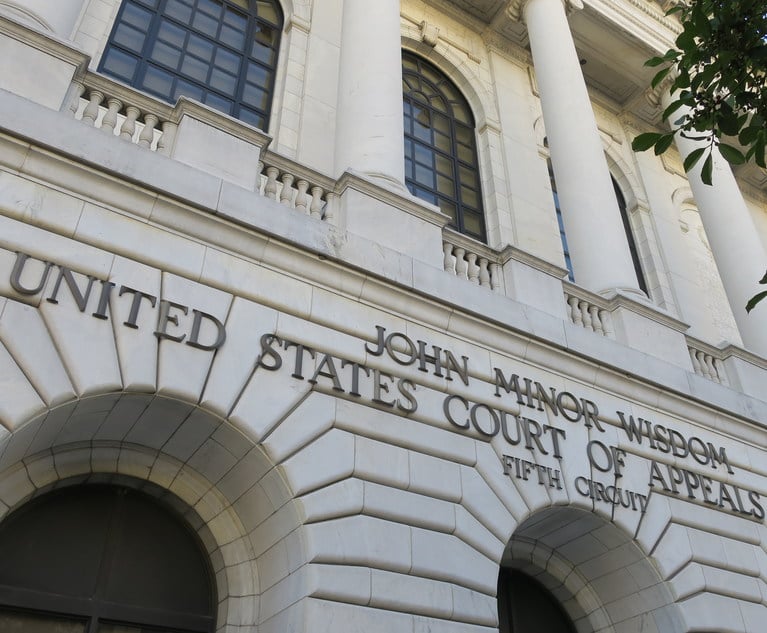The #MeToo Implications of the Supreme Court's Workplace Class-Action Case
The U.S. Supreme Court heard arguments in the consolidated cases at the start of the term in October, just before the #MeToo movement would take off nationally.
January 24, 2018 at 05:19 PM
4 minute read
 The U.S. Supreme Court. Credit: Mike Scarcella / NLJ
The U.S. Supreme Court. Credit: Mike Scarcella / NLJThe outcome of the major U.S. Supreme Court case over whether companies can ban class actions in employment agreements holds new importance as women join together to speak out against sexual misconduct in the workplace, former National Labor Relations Board general counsel Richard Griffin said Wednesday.
Griffin, who argued the case before the high court in October, said the #MeToo movement that sprung from accusations against high-profile men in power illustrates the importance of “strength in numbers.”
The trio of consolidated cases at the high court confront whether workplace arbitration agreements that ban class actions violate the National Labor Relations Act because they restrict employees' rights to engage in concerted activities. Employers and workers' rights advocates are watching this case closely. Dozens of companies have cases on hold pending the outcome of the dispute at the Supreme Court.
“It is a very important case,” Griffin said Wednesday on a panel hosted by Bloomberg Law. “It is particularly important in all the discussion we are seeing now in the #MeToo context with sexual harassment, where that is demonstrated. Once people realize they have been subjected to the same conduct, others are allowed to come forward.”
The Supreme Court case was argued just before The New York Times and The New Yorker investigations into abuses by Hollywood producer Harvey Weinstein led to a wave of accusations against powerful men. In the last few months, the movement has caused companies to reconsider internal policies and prompted legislative action.
 Richard Griffin
Richard Griffin“The importance of being able for employees to join together and proceed jointly or collectively is crucial,” said Griffin, now of counsel to Bredhoff & Kaiser in Washington.
Griffin and fellow experts on labor and employment, former NLRB member Sharon Block, Epstein, Becker & Green member Paul DeCamp and Seyfarth Shaw partner Alexander Passantino, spoke on Wednesday's panel.
Griffin said the key question isn't whether class action waivers limit workers ability to come together, but rather whether the Federal Arbitration Agreement, which says agreements should be enforced as written, holds more power.
Passantino said that the pending Supreme Court case is extremely important to employers, particularly as an effort for “certainty into the process.”
Block, executive director of Harvard Law School's Labor and Worklife Program, said forcing workers to bring claims as individuals could have the effect of taking away the rights outlined in Section 7 of the National Labor Relations Act, which protects concerted speech.
“It can eliminate protections for workers who need that protection the most,” Block said. “I think this is a tremendously important case. The consequences of it, if it comes out the wrong way, could be significant.”
DeCamp said he thinks Congress should settle the question about whether Section 7 can prohibit class actions. The current makeup of the Republican-led National Labor Relations Board, he said, would not likely have come to the same conclusion as the Obama-era board did.
Griffin, representing the NLRB, argued before the Supreme Court in the consolidated cases. The U.S. Justice Department had earlier supported the board's position under the Obama administration but, under U.S. Attorney General Jeff Sessions, switched positions to back the companies. The Justice Department at the high court argued that class action bans in employment agreements are lawful.
“What happens here if you require people to sue individually is that they don't do it at all,” Griffin said Wednesday. “They won't seek to do it if they can't do it together.”
Read more:
This content has been archived. It is available through our partners, LexisNexis® and Bloomberg Law.
To view this content, please continue to their sites.
Not a Lexis Subscriber?
Subscribe Now
Not a Bloomberg Law Subscriber?
Subscribe Now
NOT FOR REPRINT
© 2025 ALM Global, LLC, All Rights Reserved. Request academic re-use from www.copyright.com. All other uses, submit a request to [email protected]. For more information visit Asset & Logo Licensing.
You Might Like
View All
4th Circuit Revives Racial Harassment Lawsuit Against North Carolina School District
3 minute read
Legal Issues to Watch in the US Appeals Courts in 2025

Second Circuit Upholds $5M Judgment Against Trump in E. Jean Carroll Case
4 minute read
Divided 5th Circuit Shoots Down Nasdaq Diversity Rules
Trending Stories
- 1Stevens & Lee Names New Delaware Shareholder
- 2U.S. Supreme Court Denies Trump Effort to Halt Sentencing
- 3From CLO to President: Kevin Boon Takes the Helm at Mysten Labs
- 4How Law Schools Fared on California's July 2024 Bar Exam
- 5'Discordant Dots': Why Phila. Zantac Judge Rejected Bid for His Recusal
Who Got The Work
Michael G. Bongiorno, Andrew Scott Dulberg and Elizabeth E. Driscoll from Wilmer Cutler Pickering Hale and Dorr have stepped in to represent Symbotic Inc., an A.I.-enabled technology platform that focuses on increasing supply chain efficiency, and other defendants in a pending shareholder derivative lawsuit. The case, filed Oct. 2 in Massachusetts District Court by the Brown Law Firm on behalf of Stephen Austen, accuses certain officers and directors of misleading investors in regard to Symbotic's potential for margin growth by failing to disclose that the company was not equipped to timely deploy its systems or manage expenses through project delays. The case, assigned to U.S. District Judge Nathaniel M. Gorton, is 1:24-cv-12522, Austen v. Cohen et al.
Who Got The Work
Edmund Polubinski and Marie Killmond of Davis Polk & Wardwell have entered appearances for data platform software development company MongoDB and other defendants in a pending shareholder derivative lawsuit. The action, filed Oct. 7 in New York Southern District Court by the Brown Law Firm, accuses the company's directors and/or officers of falsely expressing confidence in the company’s restructuring of its sales incentive plan and downplaying the severity of decreases in its upfront commitments. The case is 1:24-cv-07594, Roy v. Ittycheria et al.
Who Got The Work
Amy O. Bruchs and Kurt F. Ellison of Michael Best & Friedrich have entered appearances for Epic Systems Corp. in a pending employment discrimination lawsuit. The suit was filed Sept. 7 in Wisconsin Western District Court by Levine Eisberner LLC and Siri & Glimstad on behalf of a project manager who claims that he was wrongfully terminated after applying for a religious exemption to the defendant's COVID-19 vaccine mandate. The case, assigned to U.S. Magistrate Judge Anita Marie Boor, is 3:24-cv-00630, Secker, Nathan v. Epic Systems Corporation.
Who Got The Work
David X. Sullivan, Thomas J. Finn and Gregory A. Hall from McCarter & English have entered appearances for Sunrun Installation Services in a pending civil rights lawsuit. The complaint was filed Sept. 4 in Connecticut District Court by attorney Robert M. Berke on behalf of former employee George Edward Steins, who was arrested and charged with employing an unregistered home improvement salesperson. The complaint alleges that had Sunrun informed the Connecticut Department of Consumer Protection that the plaintiff's employment had ended in 2017 and that he no longer held Sunrun's home improvement contractor license, he would not have been hit with charges, which were dismissed in May 2024. The case, assigned to U.S. District Judge Jeffrey A. Meyer, is 3:24-cv-01423, Steins v. Sunrun, Inc. et al.
Who Got The Work
Greenberg Traurig shareholder Joshua L. Raskin has entered an appearance for boohoo.com UK Ltd. in a pending patent infringement lawsuit. The suit, filed Sept. 3 in Texas Eastern District Court by Rozier Hardt McDonough on behalf of Alto Dynamics, asserts five patents related to an online shopping platform. The case, assigned to U.S. District Judge Rodney Gilstrap, is 2:24-cv-00719, Alto Dynamics, LLC v. boohoo.com UK Limited.
Featured Firms
Law Offices of Gary Martin Hays & Associates, P.C.
(470) 294-1674
Law Offices of Mark E. Salomone
(857) 444-6468
Smith & Hassler
(713) 739-1250










